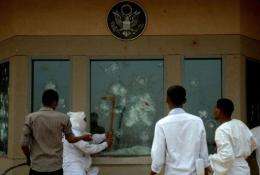Sudanese protesters try to break into the US embassy in Khartoum during a protest against an amateur film mocking Islam. Internet rights champions were fearful that free speech online may be among the victims of violence spurred by an anti-Islam video posted to YouTube.
Internet rights champions on Friday were fearful that free speech online may be among the victims of violence spurred by an anti-Islam video posted to YouTube.
A decision by YouTube parent Google to deny access to the video in Libya and Egypt even though the film's hateful message isn't aimed at a particular person was seen by some as a compassionate step onto a slippery slope.
"If they do it this once, they are going to do it in other situations," said Eva Galperin, freedom of expression coordinator at the Electronic Frontier Foundation and nopn-profit pressure group.
"There is a good chance you will hear from Google that, just this once, extenuating circumstances made them turn their back on freedom of expression; but that is just the beginning of the slippery slope."
On Friday, Google added India to the list of countries where YouTube has blocked access to the anti-Islam film, which surfaced in the United States and has since sparked deadly protests in the Muslim world.
The Pakistani and Afghan governments have blocked the movie themselves.
Indonesia, where most of the 240 million population practice Islam, has also demanded that Google-owned YouTube remove the film from its website.
Protesters have targeted US embassies over the film, which portrays the Prophet Mohammed as an immoral sexual deviant.
Four people died in the Yemeni capital Sanaa on Thursday as violence flared outside US embassies over the low-budget film.
The deaths followed the killing of a US diplomat and three colleagues in Syria Tuesday, after a mob stormed the consulate in Benghazi.
Galperin branded Google's censorship of the video a "distressing" move that "lets the thugs off the hook" by wrongly shifting responsibility to YouTube.
YouTube said that the video did not violate terms of service so would remain at the video-sharing website but that "given the very difficult situation in Libya and Egypt we have temporarily restricted access in both countries."
"Our hearts are with the families of the people murdered in yesterday's attack in Libya," the YouTube spokesman said.
The White House said Friday it nudged YouTube to consider removing the film.
National Security Council spokesman Tommy Vietor said officials "reached out to YouTube to call the video to their attention and ask them to review whether it violates their terms of use."
Extracts of the film were still available on YouTube on Friday, though were accompanied by a warning that the content was "potentially offensive or inappropriate," adding that viewer discretion was advised.
White House spokesman Jay Carney described the spreading demonstrations and attacks on US diplomatic posts in the Arab world sparked by the video as "a fairly volatile situation."
Google has made a point of not mediating content, opting to provide tools for copyright owners, governments and others to submit "take-down" notices for online content that is pirated, illegal, or in violation of service terms.
"That is one of the reasons YouTube has become this tremendous platform for expression all over the world," Galperin said.
"If YouTube decides who can handle a video and who can't, that is extraordinarily paternalistic."
(c) 2012 AFP























